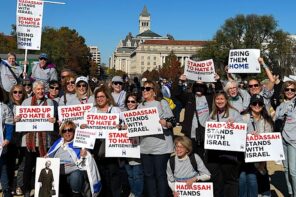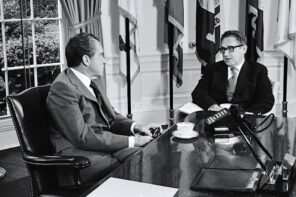Secretary of State John Kerry, not knowing he was being taped at a meeting of the Trilateral Commission, spoke of the urgency of reaching a two-state solution between the Israelis and the Palestinians, because “a unitary state winds up either being an apartheid state with second-class citizens—or it ends up being a state that destroys the capacity of Israel to be a Jewish state.”
Paul Waldman describes the resulting (and predictable) events:
[T]his controversy played out according to a familiar script: 1) Official says something uncomfortable but true about Israel; 2) The Anti-Defamation League and the American Israel Public Affairs Committee (AIPAC) condemn the statement, pretending to be shocked and appalled that anyone could ever criticize Israel; 3) Democratic and Republican senators rush to condemn the statement as well, with the Republican response a little more intense, and a little more stupid; 4) Official issues an apology, pledging not to criticize Israel so sharply in the future.
Jeffrey Goldberg explains why he avoids applying the term apartheid to Israel’s occupation of the West Bank, while still portraying Kerry’s words as coming in a “fit of candor.” The ensuing “[c]arefully coordinated, entirely spontaneous bursts of outrage” came “not only from Republicans and Israelis, but also from Democrats.” (Such pronouncements are not off-limitsfor Israeli politicians, however.)
It’s important to note that Kerry didn’t say Israel is an apartheid system, just that it risks becoming one. These are warnings worth heeding, yet in American politics it remains taboo to discuss them.
If you’re a Republican, and seeking a pat on the head and cash inflow from Sheldon Adelson, you can’t even say the word occupation.
(Side note: tomorrow the Conference of Presidents of Major Jewish Organizations will vote on whether to accept J Street, which opposes the occupation, into the fold, a move supported by the Union for Reform Judaism, the past president of the URJ, Eric Yoffie, who has had his differences with J Street, and the URJ’s rabbinic leadership, the Central Conference of American Rabbis. Incidentally, in reaction to the Kerry comment, J Street says Israel is not an apartheid state.)
Major American Jewish groups have made it such that words like “apartheid,” even taken in the context of Kerry’s remarks (that context being this is an imminent danger, but not yet a reality) create a dissonant clang in many American Jewish ears. The reason: the reality of the occupation cannot even be discussed. But if you can’t lay out the occupation’s harsh realities in plain, descriptive language, then the word “apartheid” popping out of the Secretary of State’s mouth is like a offensive siren calling people to recoil in disbelief. If people don’t get what it is about the occupation—the denial of civil and basic human rights, including through the infliction of violence—that is contrary to a democratic state, they will be programmed to react to the word apartheid as a tremendous affront, not as a prophetic warning.
Don’t think I’m excusing those reactions. I’m explaining them.
Here’s one example of how that refusal to acknowledge plays out. The New York Jewish Weekhas just published an op-ed by Oded Na’aman, an Israeli army veteran who now works with the Israeli human rights group Breaking The Silence, which, using the testimonies of former IDF soldiers, educates the public about abuses committed by the Israeli military in the occupied territories. (I wrote about Breaking The Silence, and the generational shift among American Jews on these issues, last year.) Na’aman was invited by J Street U (whose leaders and members I interviewed for that story) at the Washington University Hillel, and his appearance sparked controversy, given that the national Hillel has adopted controversial guidelines on what it considers to be acceptable speakers at campus events. (Speakers cannot, among other things, “[d]elegitimize, demonize, or apply a double standard to Israel.”)
Na’aman writes that controversy preceded his visit, although the event itself went well. “But in the days following, the assault on Hillel and J Street U escalated,” he adds, reacting to aletter written by Eric Fingerhut, President and CEO of Hillel International. In the letter, Fingerhut explained that a J Street U student initiated the invitation to Breaking The Silence, a group Hillel would not have invited itself. Nonetheless, Fingerhut admitted, Breaking The Silence “is, regrettably, part of the broad tent of dialogue regarding Israel.”
But Fingerhut et al., Na’aman writes, “seem to be more concerned with their own feelings toward Israel — their ‘tent’ — than with Israel. Mention of the actions of the IDF, the values to which Israel is committed, and concern for the well being of Israel’s residents, whether Israeli or Palestinian, are noticeably absent from Fingerhut’s letter.” (Mention of the occupation is also absent.)
Na’aman concludes:
I don’t doubt Fingerhut’s genuine concern for Israel. I am sure those who called for the event’s cancellation are also sincerely dedicated to my country. But their concern does not protect Zionism. Rather, it threatens it. If Zionism is the dream of Jews to overcome a state of mere survival and forge our own destiny, then claiming that the occupation is necessary, that Israel “has no other choice,” is the betrayal of Zionism. Israel’s rule of force over a civilian population threatens our democratic integrity, moral character, and international standing — in short, it threatens that future. . . .
The testimonies portray a system of control and expropriation of land that is founded on the use of military force. Arbitrary violence is of the essence of military rule, which cannot rely on democratic legitimacy. As enforcers of Israel’s regime in the Occupied Territories, we know of “mock arrests,” random humiliating punishments; use of civilians as human shields; numerous checkpoints and barriers between and inside Palestinian villages and cities; “mappings;” curfews; beatings; attack dogs; and simple, constant, everyday chaos and panic. . . .
But instead of gathering information and forming a position, too many focus on their own feelings, and the boundaries of their own conversation. Instead of an actual dialogue about our reality and future, they are content to have a conversation about the conversation about Israel. Rather than respond to what they hear, they argue over whether they should plug their ears. This may serve some staff and some donors of Hillel International, but it doesn’t serve Israel. It takes some chutzpah to claim that by silencing our voices you are protecting our own country from us.
(emphasis mine).
So you see the cycle of chutzpah here. It’s as if Breaking The Silence is talking about some abstraction, and its goals are to “disparage the IDF.” If you don’t believe there is an occupation, you can’t believe Breaking The Silence is doing anything but undermining the military that ensures Israel’s security. If you don’t believe Breaking The Silence’s 950 testimonies, how can you even let yourself hear the word “apartheid” applied to Israel—if only as a warning? You don’t. You plug your ears. As Na’aman has written elsewhere, “Those who acquiesce to Israel’s occupation have given up the hope of a decent Jewish state in which the rule of law prevails. For us, this is not an option. By silencing criticisms of Israel’s occupation, the ‘lovers’ of Israel are destroying our country.”




